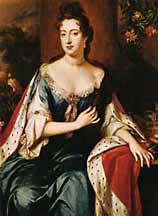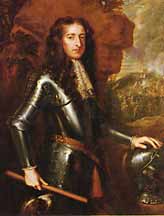 William III and Mary II
William III and Mary IIHouse of Orange and Stuart -- Reigned: 1689-1702 William: 1650-1702, Mary: 1662-1694
William III (William of Orange), born in 1650, was the son of William, Prince of Orange, and Mary Stuart (daughter of Charles I). Husband and wife were also first cousins, both being a grandchild of Charles I. William, one of the most significant players on the continent, constantly strove to spread Protestantism and decrease the Catholic influence of France and Spain. He died in 1702 from complications after being thrown from his horse. William and Mary began their marriage under duress. She was twelve years younger than he and found him repulsive. Although terribly homesick while living in Holland, she eventually came to love both the man and his country. William maintained a long-lasting affair with Elizabeth Villiers, one of Mary's ladies-in-waiting, which prompted Mary to be completely devoted and subservient to her husband. William's demeanor towards Mary seemed cold and indifferent on the surface, but his deep grief over her death indicated just how much he relied upon and respected her. The inability of James II to work with Parliament, combined with his reckless Catholic appointments, brought both the political and religious spheres of the monarchy under fire again. The situation reached its climax in 1688. James established an alliance with Catholic France; arrested Archbishop Sancroft and six other bishops for failing to proclaim the Catholic faith; tampered with private property and historic rights; and produced a male heir after abandoning Anglicanism for Catholicism, which destroyed Parliament's hopes that the crown would pass to the Protestant children of James' first marriage. Parliament appealed to William of Orange, urging him to save England from a Catholic takeover. William gathered his forces and landed in England in November of 1688. William's professional troops and the welcome they received from the English landholders intimidated James. James was captured while fleeing from London, but William ensured him safe passage to France. James, feeling alone and realizing his lack of popular support, abdicated and accepted his exile in France. James made one attempt to regain the crown, but his French and Irish forces were soundly defeated at the Battle of Boyne and James returned to France to live the rest of his life in exile. Parliament, although victorious in unseating James, was faced with a dilemma. They wanted the throne to be the sole possession of Mary, with William serving as Prince Consort, but Mary refused due to her self-imposed subservience to her husband. William was reluctant to accept the throne by means of conquest, preferring to be named king by Parliament through birthright. Parliament succumbed to the wishes of William and Mary, and the pair acceded as co-rulers. As the reign unfolded, however, Parliament's original plan became the reality of the situation. William was considerably more concerned with his holdings and the Protestant-Catholic conflicts on the continent, leaving Mary behind in England to rule. William and the English populace were conspicuously indifferent to each other, but Mary loved England and the English people loved her. Whigs and Tories in Parliament, divided over the course of English commerce and Puritan-Anglican tensions, united in two goals: to maintain supremacy over the monarchy, and to forever eliminate Catholic influence in government. The character of the monarchy was altered evermore as oligarchic rule fueled parliamentary reform of government. The Bill of Rights (England's), enacted in 1689, was more a bill of limitations: the use of royal and prerogative rights (the foundation of Tudor-Stuart authority) was forbidden, the king could only maintain a standing army with parliamentary consent, and an annual income of £600,000 was disbursed to the monarchs, with grants for specific purposes also appropriated by Parliament. The Mutiny Act ensured that Parliament would be prorogued every year by requiring parliamentary approval of the armed forces on a yearly basis. The Bank of England was established to deal with financing government. The Settlement Act of 1701 was the final act to fully establish the supremacy of Parliament. King William's War, a series of continental battles fought primarily to push Protestantism, had heavily taxed English economic resources; to retaliate, The Settlement Act forbad wars without Parliament's consent. The act forbad members of the House of Commons, as well as all non-indigenous people, from holding public office and subjected ministerial appointments to parliamentary approval. Judges were removed from royal punishment, as they had to now be formally impeached by the House of Parliament, with no royal pardon. As a final assertion of supremacy, Parliament was granted the right to name the succession; James' Catholic offspring with Mary of Modena were barred from the throne. The crown was to pass to the descendants of Sophia, granddaughter of James I and niece of Charles I, who had married into the German Protestant House of Hanover. Parliament had successfully barred the accession of any more Catholic monarchs. The reign of Mary II and William III marked the end of royal prerogative. Parliament, with the authority of the oligarchy, came into a position of prominence regarding the governing of England. William spent the greatest part of the reign embroiled in continental battles against Catholicism. Evelyn, in her Diary, made mention of Mary's lack of remorse concerning the abdication of her father, but Evelyn also accurately assessed the characters of the king and queen:
|
All rights reserved. For details and contact information: See License Agreement, Copyright Notice. |

